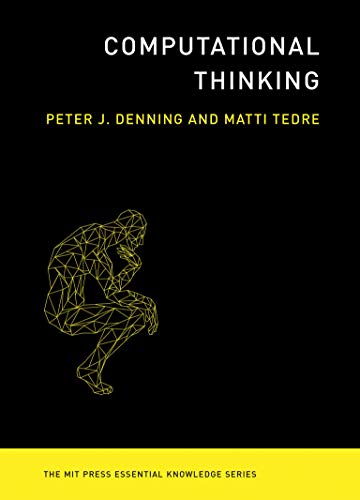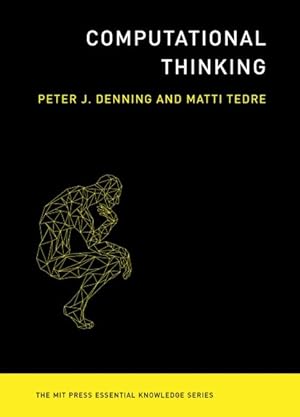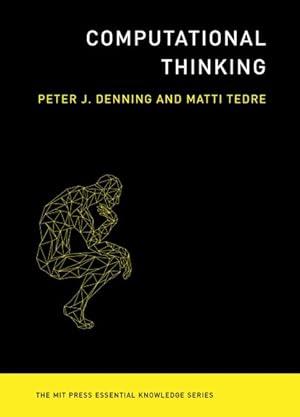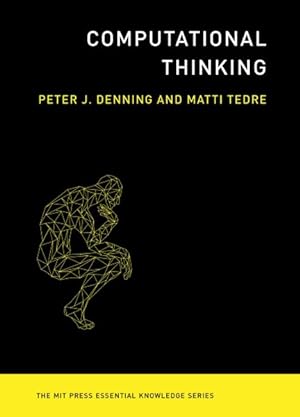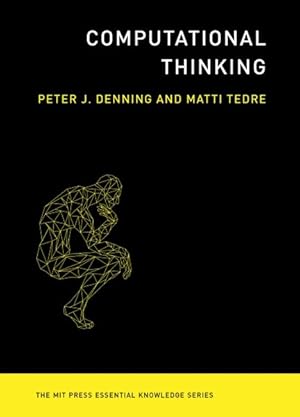computational thinking di denning peter (42 risultati)
Filtri di ricerca
Tipo di articolo
- Tutti i tipi di prodotto
- Libri (42)
- Riviste e Giornali (Nessun altro risultato corrispondente a questo perfezionamento)
- Fumetti (Nessun altro risultato corrispondente a questo perfezionamento)
- Spartiti (Nessun altro risultato corrispondente a questo perfezionamento)
- Arte, Stampe e Poster (Nessun altro risultato corrispondente a questo perfezionamento)
- Fotografie (Nessun altro risultato corrispondente a questo perfezionamento)
- Mappe (Nessun altro risultato corrispondente a questo perfezionamento)
- Manoscritti e Collezionismo cartaceo (Nessun altro risultato corrispondente a questo perfezionamento)
Condizioni Maggiori informazioni
- Nuovo (29)
- Come nuovo, Ottimo o Quasi ottimo (4)
- Molto buono o Buono (8)
- Discreto o Mediocre (1)
- Come descritto (Nessun altro risultato corrispondente a questo perfezionamento)
Legatura
- Tutte
- Rilegato (Nessun altro risultato corrispondente a questo perfezionamento)
- Brossura (42)
Ulteriori caratteristiche
- Prima ed. (Nessun altro risultato corrispondente a questo perfezionamento)
- Copia autograf. (Nessun altro risultato corrispondente a questo perfezionamento)
- Sovracoperta (Nessun altro risultato corrispondente a questo perfezionamento)
- Con foto (11)
- Non Print on Demand (42)
Lingua (1)
Spedizione gratuita
Paese del venditore
Valutazione venditore
-
EUR 11,20
Convertire valutaEUR 4,50 per la spedizione da Germania a ItaliaQuantità: 1 disponibili
Aggiungi al carrelloCondizione: good. Befriedigend/Good: Durchschnittlich erhaltenes Buch bzw. Schutzumschlag mit Gebrauchsspuren, aber vollständigen Seiten. / Describes the average WORN book or dust jacket that has all the pages present.
-
EUR 15,44
Convertire valutaEUR 2,30 per la spedizione da Regno Unito a ItaliaQuantità: Più di 20 disponibili
Aggiungi al carrelloPaperback. Condizione: New. An introduction to computational thinking that traces a genealogy beginning centuries before the digital computer.A few decades into the digital era, scientists discovered that thinking in terms of computation made possible an entirely new way of organizing scientific investigation; eventually, every field had a computational branch: computational physics, computational biology, computational sociology. More recently, "computational thinking" has become part of the K-12 curriculum. But what is computational thinking? This volume in the MIT Press Essential Knowledge series offers an accessible overview, tracing a genealogy that begins centuries before digital computers and portraying computational thinking as pioneers of computing have described it. The authors explain that computational thinking (CT) is not a set of concepts for programming; it is a way of thinking that is honed through practice: the mental skills for designing computations to do jobs for us, and for explaining and interpreting the world as a complex of information processes. Mathematically trained experts (known as "computers") who performed complex calculations as teams engaged in CT long before electronic computers. The authors identify six dimensions of today's highly developed CT-methods, machines, computing education, software engineering, computational science, and design-and cover each in a chapter. Along the way, they debunk inflated claims for CT and computation while making clear the power of CT in all its complexity and multiplicity.
-
EUR 16,03
Convertire valutaEUR 3,44 per la spedizione da U.S.A. a ItaliaQuantità: Più di 20 disponibili
Aggiungi al carrelloPaperback. Condizione: New. An introduction to computational thinking that traces a genealogy beginning centuries before the digital computer.A few decades into the digital era, scientists discovered that thinking in terms of computation made possible an entirely new way of organizing scientific investigation; eventually, every field had a computational branch: computational physics, computational biology, computational sociology. More recently, "computational thinking" has become part of the K-12 curriculum. But what is computational thinking? This volume in the MIT Press Essential Knowledge series offers an accessible overview, tracing a genealogy that begins centuries before digital computers and portraying computational thinking as pioneers of computing have described it. The authors explain that computational thinking (CT) is not a set of concepts for programming; it is a way of thinking that is honed through practice: the mental skills for designing computations to do jobs for us, and for explaining and interpreting the world as a complex of information processes. Mathematically trained experts (known as "computers") who performed complex calculations as teams engaged in CT long before electronic computers. The authors identify six dimensions of today's highly developed CT-methods, machines, computing education, software engineering, computational science, and design-and cover each in a chapter. Along the way, they debunk inflated claims for CT and computation while making clear the power of CT in all its complexity and multiplicity.
-
Computational Thinking (The MIT Press Essential Knowledge series)
Da: AproposBooks&Comics, London, Regno Unito
EUR 10,60
Convertire valutaEUR 9,14 per la spedizione da Regno Unito a ItaliaQuantità: 1 disponibili
Aggiungi al carrello -
Computational Thinking (The MIT Press Essential Knowledge series)
Da: Books From California, Simi Valley, CA, U.S.A.
EUR 7,81
Convertire valutaEUR 12,48 per la spedizione da U.S.A. a ItaliaQuantità: 17 disponibili
Aggiungi al carrellopaperback. Condizione: Very Good. Cover and edges may have some wear.
-
EUR 17,60
Convertire valutaEUR 3,44 per la spedizione da U.S.A. a ItaliaQuantità: Più di 20 disponibili
Aggiungi al carrelloPaperback. Condizione: New. An introduction to computational thinking that traces a genealogy beginning centuries before the digital computer.A few decades into the digital era, scientists discovered that thinking in terms of computation made possible an entirely new way of organizing scientific investigation; eventually, every field had a computational branch: computational physics, computational biology, computational sociology. More recently, "computational thinking" has become part of the K-12 curriculum. But what is computational thinking? This volume in the MIT Press Essential Knowledge series offers an accessible overview, tracing a genealogy that begins centuries before digital computers and portraying computational thinking as pioneers of computing have described it. The authors explain that computational thinking (CT) is not a set of concepts for programming; it is a way of thinking that is honed through practice: the mental skills for designing computations to do jobs for us, and for explaining and interpreting the world as a complex of information processes. Mathematically trained experts (known as "computers") who performed complex calculations as teams engaged in CT long before electronic computers. The authors identify six dimensions of today's highly developed CT-methods, machines, computing education, software engineering, computational science, and design-and cover each in a chapter. Along the way, they debunk inflated claims for CT and computation while making clear the power of CT in all its complexity and multiplicity.
-
Computational Thinking (The MIT Press Essential Knowledge series)
Da: Books From California, Simi Valley, CA, U.S.A.
EUR 9,39
Convertire valutaEUR 12,48 per la spedizione da U.S.A. a ItaliaQuantità: 10 disponibili
Aggiungi al carrellopaperback. Condizione: Fine.
-
EUR 19,58
Convertire valutaEUR 2,00 per la spedizione da Irlanda a ItaliaQuantità: 10 disponibili
Aggiungi al carrelloCondizione: New. 2019. Paperback. . . . . .
-
EUR 17,30
Convertire valutaEUR 5,79 per la spedizione da Regno Unito a ItaliaQuantità: 1 disponibili
Aggiungi al carrelloPAP. Condizione: New. New Book. Shipped from UK. Established seller since 2000.
-
EUR 15,31
Convertire valutaEUR 7,77 per la spedizione da Regno Unito a ItaliaQuantità: 10 disponibili
Aggiungi al carrelloPaperback / softback. Condizione: New. New copy - Usually dispatched within 4 working days. 284.
-
EUR 16,36
Convertire valutaEUR 8,03 per la spedizione da Regno Unito a ItaliaQuantità: 2 disponibili
Aggiungi al carrelloCondizione: NEW.
-
EUR 16,86
Convertire valutaEUR 7,75 per la spedizione da U.S.A. a ItaliaQuantità: 3 disponibili
Aggiungi al carrelloCondizione: New.
-
EUR 23,33
Convertire valutaEUR 1,89 per la spedizione da U.S.A. a ItaliaQuantità: 10 disponibili
Aggiungi al carrelloCondizione: New. 2019. Paperback. . . . . . Books ship from the US and Ireland.
-
Computational Thinking (The MIT Press Essential Knowledge series)
Da: California Books, Miami, FL, U.S.A.
EUR 17,73
Convertire valutaEUR 7,75 per la spedizione da U.S.A. a ItaliaQuantità: Più di 20 disponibili
Aggiungi al carrelloCondizione: New.
-
EUR 13,90
Convertire valutaEUR 11,62 per la spedizione da U.S.A. a ItaliaQuantità: 5 disponibili
Aggiungi al carrelloPaperback or Softback. Condizione: New. Computational Thinking. Book.
-
Computational Thinking (The MIT Press Essential Knowledge series)
Editore: MIT Press Ltd, United States, 2019
ISBN 10: 0262536560 ISBN 13: 9780262536561
Lingua: Inglese
Da: WorldofBooks, Goring-By-Sea, WS, Regno Unito
EUR 15,72
Convertire valutaEUR 10,34 per la spedizione da Regno Unito a ItaliaQuantità: 3 disponibili
Aggiungi al carrelloPaperback. Condizione: Very Good. An introduction to computational thinking that traces a genealogy beginning centuries before the digital computer. A few decades into the digital era, scientists discovered that thinking in terms of computation made possible an entirely new way of organizing scientific investigation; eventually, every field had a computational branch: computational physics, computational biology, computational sociology. More recently, computational thinking has become part of the K12 curriculum. But what is computational thinking? This volume in the MIT Press Essential Knowledge series offers an accessible overview, tracing a genealogy that begins centuries before digital computers and portraying computational thinking as pioneers of computing have described it. The authors explain that computational thinking (CT) is not a set of concepts for programming; it is a way of thinking that is honed through practice: the mental skills for designing computations to do jobs for us, and for explaining and interpreting the world as a complex of information processes. Mathematically trained experts (known as computers) who performed complex calculations as teams engaged in CT long before electronic computers. The authors identify six dimensions of today's highly developed CTmethods, machines, computing education, software engineering, computational science, and designand cover each in a chapter. Along the way, they debunk inflated claims for CT and computation while making clear the power of CT in all its complexity and multiplicity. The book has been read, but is in excellent condition. Pages are intact and not marred by notes or highlighting. The spine remains undamaged.
-
EUR 19,55
Convertire valutaEUR 7,95 per la spedizione da Germania a ItaliaQuantità: 3 disponibili
Aggiungi al carrelloCondizione: New.
-
EUR 11,55
Convertire valutaEUR 17,21 per la spedizione da U.S.A. a ItaliaQuantità: 15 disponibili
Aggiungi al carrelloCondizione: New.
-
EUR 12,55
Convertire valutaEUR 16,54 per la spedizione da U.S.A. a ItaliaQuantità: 1 disponibili
Aggiungi al carrelloCondizione: Good. Used book that is in clean, average condition without any missing pages.
-
EUR 18,06
Convertire valutaEUR 11,49 per la spedizione da Regno Unito a ItaliaQuantità: 2 disponibili
Aggiungi al carrelloPaperback. Condizione: Brand New. 242 pages. 7.00x5.00x0.75 inches. In Stock.
-
EUR 19,76
Convertire valutaEUR 10,17 per la spedizione da Regno Unito a ItaliaQuantità: 1 disponibili
Aggiungi al carrelloCondizione: New.
-
Computational Thinking (The MIT Press Essential Knowledge series)
Da: Ria Christie Collections, Uxbridge, Regno Unito
EUR 19,48
Convertire valutaEUR 10,33 per la spedizione da Regno Unito a ItaliaQuantità: 2 disponibili
Aggiungi al carrelloCondizione: New. In.
-
EUR 30,50
Convertire valutaGratis per la spedizione da U.S.A. a ItaliaQuantità: 1 disponibili
Aggiungi al carrelloCondizione: New. This is a Brand-new US Edition. This Item may be shipped from US or any other country as we have multiple locations worldwide.
-
EUR 19,59
Convertire valutaEUR 11,49 per la spedizione da Regno Unito a ItaliaQuantità: 1 disponibili
Aggiungi al carrelloPaperback. Condizione: Brand New. 242 pages. 7.00x5.00x0.75 inches. In Stock.
-
EUR 31,86
Convertire valutaGratis per la spedizione da U.S.A. a ItaliaQuantità: 1 disponibili
Aggiungi al carrelloCondizione: New. Brand New Original US Edition. Customer service! Satisfaction Guaranteed.
-
EUR 22,22
Convertire valutaEUR 9,70 per la spedizione da Germania a ItaliaQuantità: 2 disponibili
Aggiungi al carrelloCondizione: New. Peter J. Denning is Distinguished Professor of Computer Science at the Naval Postgraduate School, Monterey, California. He is the coauthor of The Innovator s Way: Essential Practices for Successful Innovation and Great Principles of Computing,.
-
EUR 17,29
Convertire valutaEUR 17,24 per la spedizione da Regno Unito a ItaliaQuantità: 1 disponibili
Aggiungi al carrelloCondizione: New.
-
EUR 19,15
Convertire valutaEUR 17,21 per la spedizione da U.S.A. a ItaliaQuantità: 15 disponibili
Aggiungi al carrelloCondizione: As New. Unread book in perfect condition.
-
EUR 19,82
Convertire valutaEUR 17,24 per la spedizione da Regno Unito a ItaliaQuantità: 1 disponibili
Aggiungi al carrelloCondizione: As New. Unread book in perfect condition.
-
EUR 21,49
Convertire valutaEUR 14,99 per la spedizione da Germania a ItaliaQuantità: 2 disponibili
Aggiungi al carrelloTaschenbuch. Condizione: Neu. Neuware - This pocket-sized introduction to computational thinking and problem-solving traces its genealogy centuries before the digital computer. A few decades into the digital era, scientists discovered that thinking in terms of computation made possible an entirely new way of organizing scientific investigation. Eventually, every field had a computational branch: computational physics, computational biology, computational sociology. More recently, computational thinking has become part of the K 12 curriculum. But what is computational thinking This volume in the MIT Press Essential Knowledge series offers an accessible overview tracing a genealogy that begins centuries before digital computers and portraying computational thinking as the pioneers of computing have described it.The authors explain that computational thinking (CT) is not a set of concepts for programming; it is a way of thinking that is honed through practice: the mental skills for designing computations to do jobs for us, and for explaining and interpreting the world as a complex of information processes. Mathematically trained experts (known as computers ) who performed complex calculations as teams engaged in CT long before electronic computers. In each chapter, the authoridentify different dimensions of today's highly developed CT: Computational Methods Computing Machines Computing Education Software Engineering Computational Science DesignAlong the way, they debunk inflated claims for CT and computation while making clear the power of CT in all its complexity and multiplicity.


